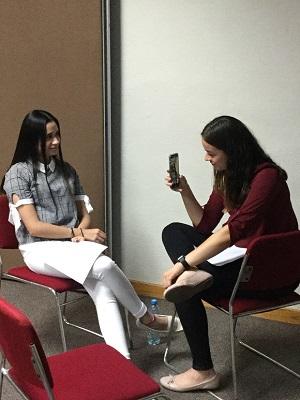What’s in it for me?
‘How do I stand out over people applying for a similar job?’ ‘What are business owners looking for in their graduate recruits?’
These were just a few of the questions posed by the eager undergraduate student participants of a two-hour employability workshop facilitated by us at the CETYS Universidad Mexicali campus, as part of an NTU / CETYS HE Alliances British Council initiative to promote employability and trans-national mobility: Success for All: enhancing student employability prospects and mobility across transnational communities.
What were we seeking to achieve?
Our learning and teaching approach to the workshop was underpinned by our desire to enable the students to synthesise and articulate learning from their undergraduate and life-wide experiences to construct personal, viable and aspirational future possibilities, and to develop personal belief, confidence and self-efficacy to manage their future transitions for employability. This is an approach detailed in the Advance HE Enhancing Graduate Employability: a case study compendium (Angela Vesey and Anne Owen, NTU).
What happened in the session?
A lively warm-up discussion about the changing global graduate landscape, accompanied by a student activity on global skills for the 21st Century ‘you’re more skilled than you think’, using World Economic Forum list of top 10 skills to thrive in 2020, paved the way to a smooth transition for a student consideration of the value of a developing a growth mindset for their personal and professional development.
Forty minutes in, with the context explained, and the justification for effective self- presentation provided, students were then briefed on the substantive ‘elevator pitch’ task. The purpose of the pitch was explained and a strategy for approaching the pitch was shared, using the ‘STAR’ technique to present evidence. Participants were then invited to work in pairs to produce their own individual pitches working with their chosen partner as a critical friend to craft their pitches together, before recording their final pitch on their phone, in English or Spanish, or in some cases, both!

What did the students learn?
Students responded enthusiastically to the task and were able to articulate a range of learning to enhance their personal effectiveness and self-efficacy:
‘I learnt that mindset can be very crucial in the way you take decisions or grow as a person.’
‘I gathered many techniques to build and create an effective elevator pitch.’
‘I learnt how not to get distracted from my career goals.’
What is the value of this approach?
This approach has proven that there are a range of creative possibilities for personalised and inclusive approaches for employability which can be effectively utilised by students to capture students’ learning, whatever the academic or cultural context. It also highlights the importance of providing students not only with the opportunity to identify and reflect on their life-wide learning but to practice the articulation of its value to a range of audiences.
So, what next?
- How might this approach add value to your own learning and teaching contexts?
- How could we make the most of our existing curriculum to promote the self-efficacy of our learners?
- Do we need to reimagine a new curriculum to enable this to happen?
- How do we ensure that such learning meets the specific requirements of discipline and professional bodies and is effectively and fairly assessed?
- In what way, could this activity be used to embrace multiple learning and teaching agendas, as well as employability, for example, sustainability and enterprise and entrepreneurship?
Angela Vesey and Helen Reed are employability managers in the School of Social Sciences at Nottingham Trent University. Their work with CETYS Universidad students uses the learning and teaching approach developed as part of a synoptic assessment in the final year of an undergraduate programme in the School of Social Sciences and detailed further in Enhancing Graduate Employability: a case study compendium.
Call for submissions: Employability Symposium 2020: Breaking the mould – colleagues are invited to submit an abstract for either a 20-minute presentation or a 45-minute workshop before 18 February 2020. Submit your paper now.